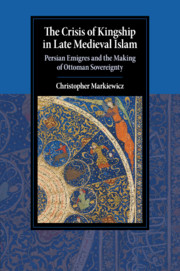Book contents
- The Crisis of Kingship in Late Medieval Islam
- Cambridge Studies in Islamic Civilization
- The Crisis of Kingship in Late Medieval Islam
- Copyright page
- Contents
- Figures
- Maps
- Acknowledgments
- Note on Usage
- Abbreviations
- Book part
- Introduction
- Part I
- Part II
- 4 The Timurid Vocabulary of Sovereignty
- 5 The Canons of Conventional Histories
- 6 Ottoman Sovereignty on the Cusp of Universal Empire
- Conclusion
- Book part
- Bibliography
- Index
- Series page
6 - Ottoman Sovereignty on the Cusp of Universal Empire
from Part II
Published online by Cambridge University Press: 03 August 2019
- The Crisis of Kingship in Late Medieval Islam
- Cambridge Studies in Islamic Civilization
- The Crisis of Kingship in Late Medieval Islam
- Copyright page
- Contents
- Figures
- Maps
- Acknowledgments
- Note on Usage
- Abbreviations
- Book part
- Introduction
- Part I
- Part II
- 4 The Timurid Vocabulary of Sovereignty
- 5 The Canons of Conventional Histories
- 6 Ottoman Sovereignty on the Cusp of Universal Empire
- Conclusion
- Book part
- Bibliography
- Index
- Series page
Summary
The Aqquyunlu – and subsequent Ottoman and Mamluk – adaptation of the Timurid vocabulary of sovereignty does not suggest that these sultanates lacked terminological innovation in their own right. In fact, many of the polities of the fifteenth century, and perhaps particularly the Aqquyunlu, were concerned with developing innovative titles to describe their sovereignty.1 To be sure, such innovations shared the basic presuppositions of the Timurid vocabulary of sovereignty of the early fifteenth century. In most instances, the terminology and its underlying epistemological references rejected, or at least sidestepped, juridical or genealogical definitions of sovereignty, which tended to exclude the legitimating claims of the men who actually wielded political authority in the fifteenth century. As we have seen in , Timurid strategies for legitimation sought to bolster claims to authority through the divine or cosmic favor shown to Timurid princes. These arguments, in contrast to the relatively staid and constricting juridical and genealogical parameters developed by legal scholars and the upholders of Chinggisid tradition, drew upon a wide array of astrological, mystical, philosophical, and occult doctrines and freely mixed ideas from these varied traditions to create a compelling and universalizing conception of kingship.
- Type
- Chapter
- Information
- The Crisis of Kingship in Late Medieval IslamPersian Emigres and the Making of Ottoman Sovereignty, pp. 240 - 284Publisher: Cambridge University PressPrint publication year: 2019

